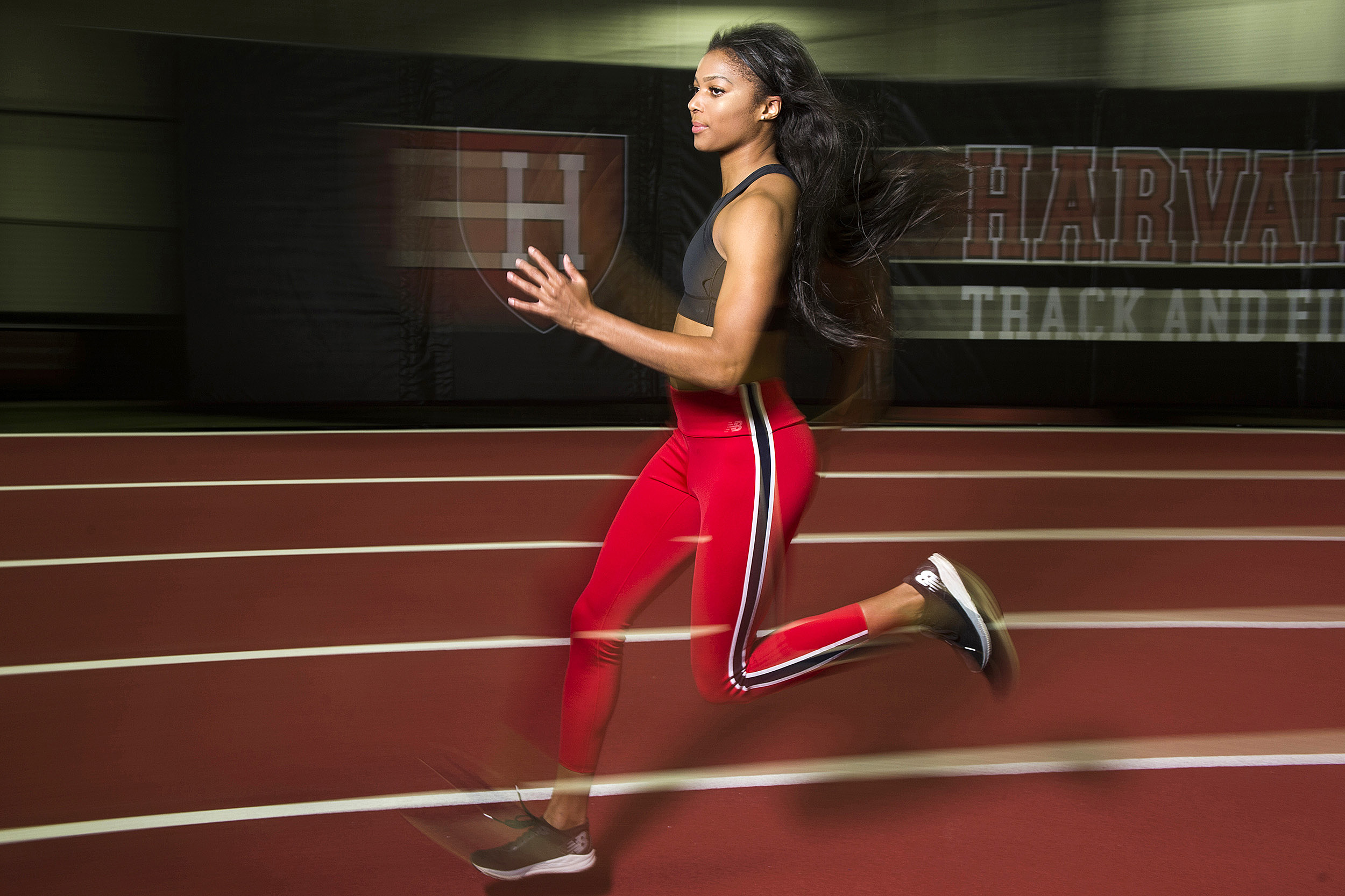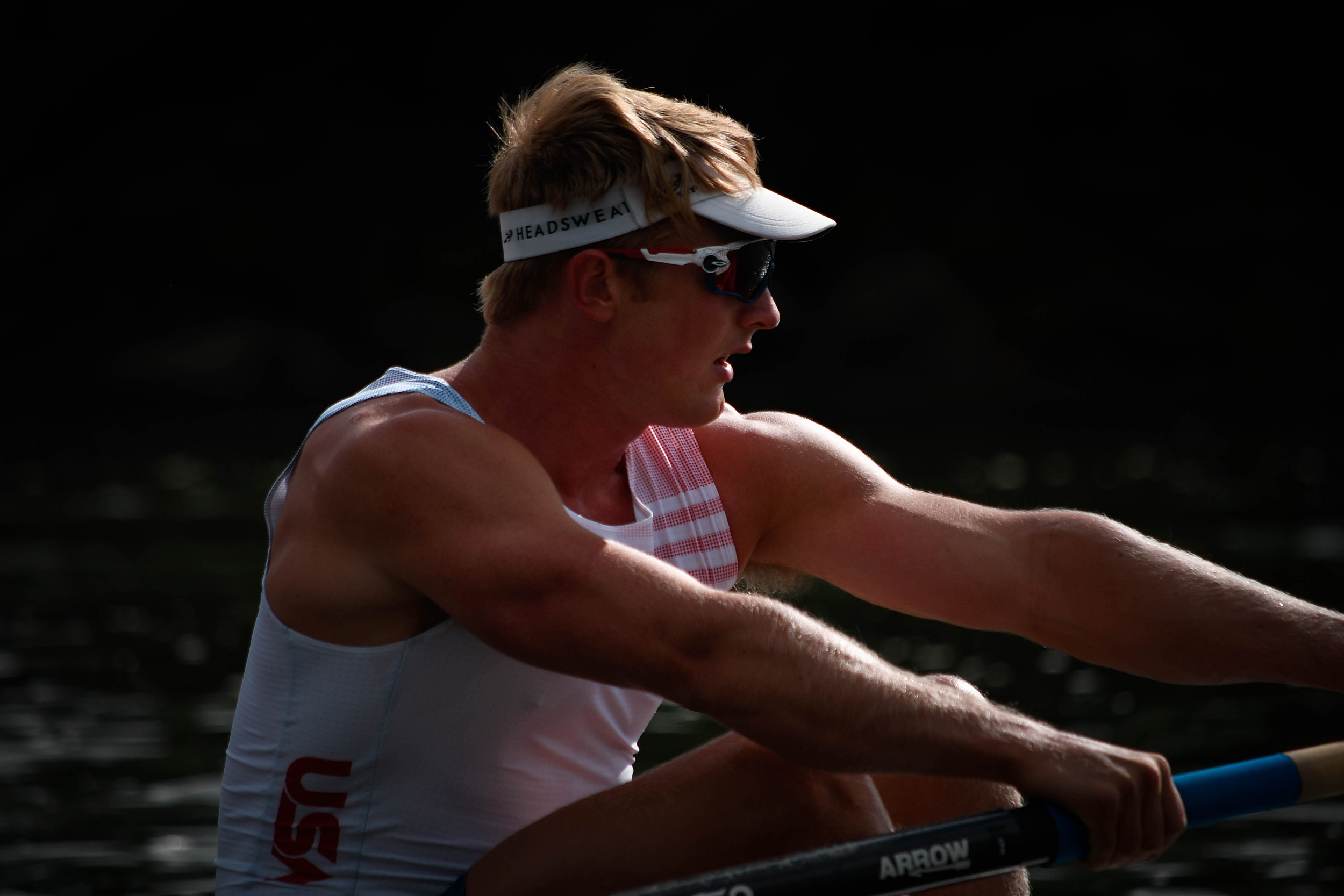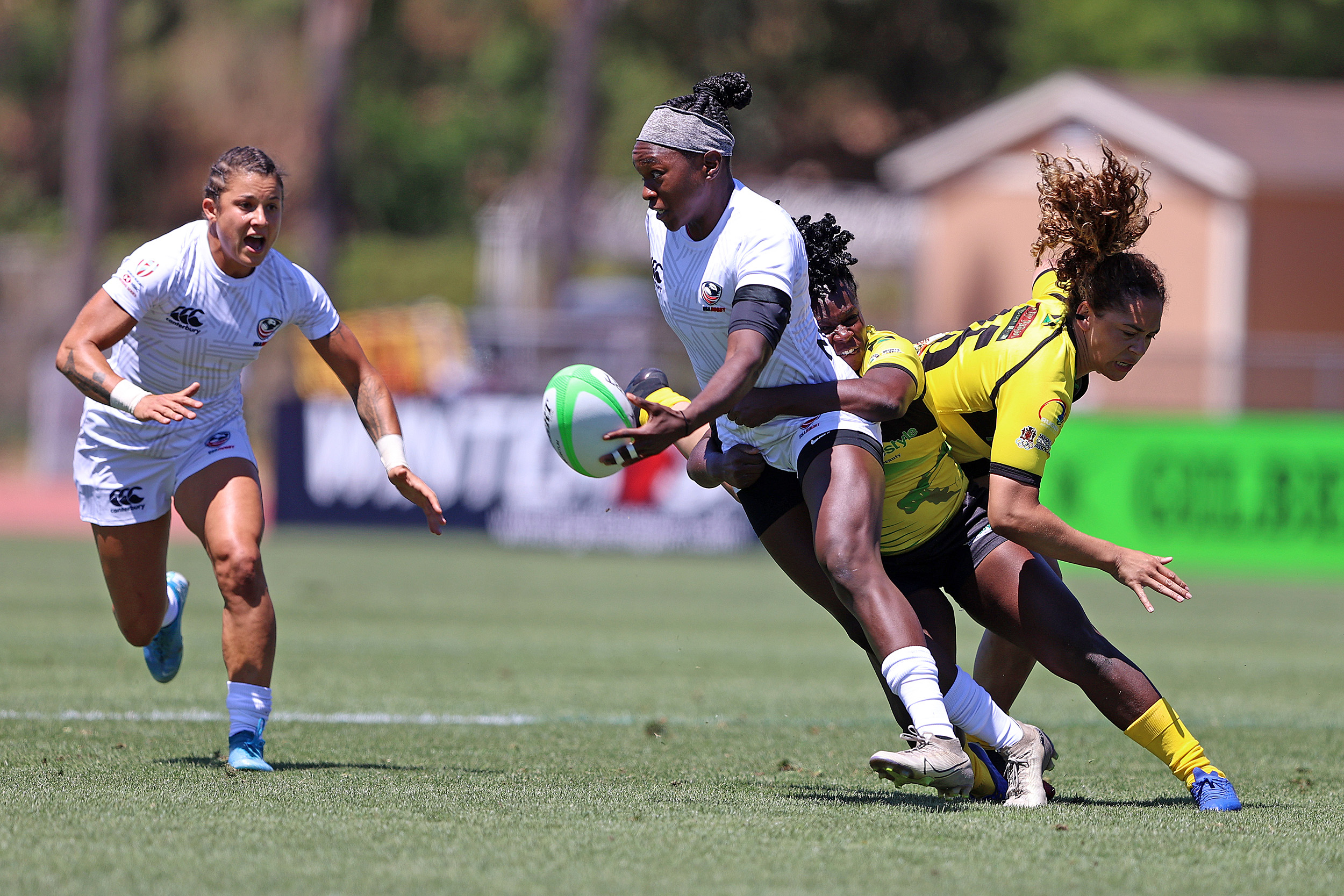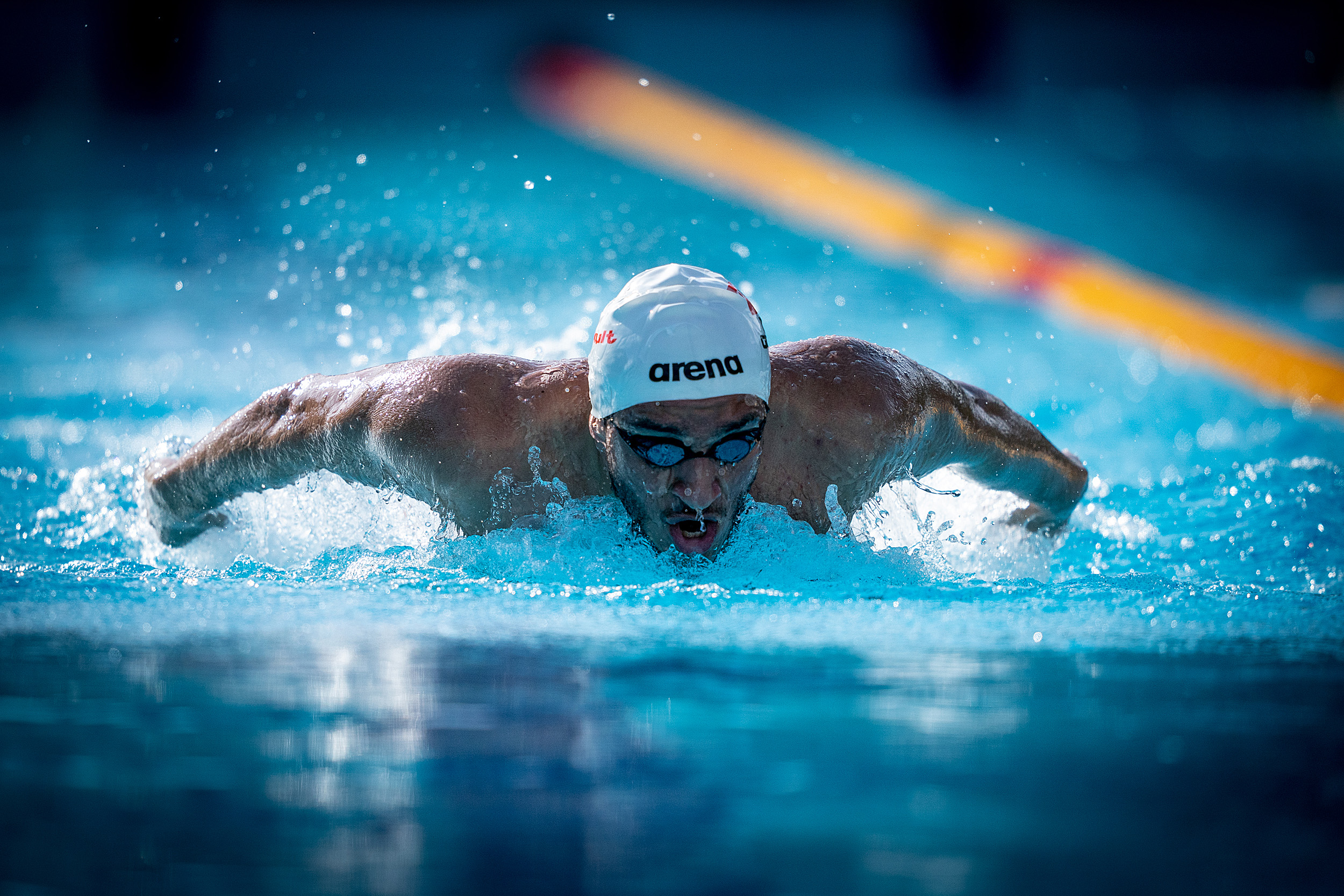
Illustration by Judy Blomquist
Hey, I know that sprinter in the 200!
16 from Harvard to take part in pandemic-era XXXII Olympiad
They number 16 and will represent their home nations of the U.S., Estonia, Thailand, Turkey, and Australia in the XXXII Olympiad in Tokyo starting July 23. The members of this year’s Olympic and Paralympic Games contingent from Harvard, made up of students, alumni, and a coach, will participate in running, swimming, fencing, rowing, and rugby competitions over the two-week event. To get here the athletes have already had to endure a one-year coronavirus delay of the Games, isolation from teammates and coaches, and months of improvised training under COVID lockdown. In addition while in Tokyo they still must avoid other global athletes in the Olympic Village to cut the risk of infection, adhere to daily testing, and compete without fans in the stands. Still, they say, it’s all been worth it, for a chance to attend the Games and go against the best of the best. Here are some of their stories.
Gabby Thomas ’19 – Track and Field

Jon Chase/Harvard file photo
If you’ve been paying to national media in recent weeks, you’ve likely seen images of Gabby Thomas crossing the finish line at the Olympic Track and Field Trials in Eugene, Oregon, on June 26, her arms in the air, a look of pure joy on her face. Thomas not only qualified for the Olympic team in the 200-meter dash, she also came close to breaking the world record — her 21.61-second race put her behind the only two faster runs ever logged in the event, both by Florence Griffith Joyner, including her 21.34-second, record-setting sprint at the 1988 Seoul Olympics.
On a recent call from Texas, where she trains while pursuing her master’s degree in epidemiology at the University of Texas, Thomas said she likely could have upped her winning trial time if she hadn’t thrown her hands up in celebrationand instead continued to pump her arms as she neared the finish. “When I was crossing the line, I just remember thinking, ‘Oh my God, I won,’… I pictured myself winning that race so many times before it actually happened. And then it was happening.”
It wasn’t Thomas’ first time trying to qualify for the international competition. Five years ago, she ran for a chance to compete at the 2016 Olympic Games in Brazil. She missed the cut, but as a Harvard first-year fresh off a successful College season (she broke several Crimson and Ivy League records), she was just excited to be there with some of the field’s most accomplished athletes. “It was a fun experience,” said Thomas. “I remember being pretty starstruck.”
Flash forward five years, and Thomas is the star. The last few weeks have been a whir of TV appearances, and interviewswith news organizations such as The Washington Post and The New York Times. She has also received message of support from the likes of actor Ashton Kutcher, Reddit co-founder Alexis Ohanian, who is also Serena Williams’ husband, and even some political notables. “The White House press secretary [Jen Psaki] tweeting at me was really exciting,” said Thomas. But she’s refusing to let the attention distract her from her goal. Coming into the qualifying meet, Thomas was intent on just trying to make the team. Then came that blistering run and “the goal immediately switched from just becoming Olympian, to becoming an Olympic gold medalist,” she said.
Thomas actually has two shots at medals, in the 200-meter event and as part of the 4 x 100 team in Tokyo.
Thomas said her Harvard time helped her grow as an athlete and a person and fueled her passion for track. Inspired by her coach and her teammates who stressed the importance of being well-rounded in sports and life, she made sure to take time away from running to focus on her studies and other interests. That balance in her life, she said, helped her love running even more. “Having other things outside of track that I was really interested in and passionate about, I think it helped me just really appreciate my time on the track,” said Thomas, who hopes to one day run her own nonprofit or hospital where she can bring her “perspective, and my passion for diversity and public health to the field.”
Besides coping with lockdowns during COVID, which included often training alone, searching for unshuttered tracks, and long workouts on grass fields, Thomas had to face a health scare unrelated to the pandemic. Doctors noticed a spot on her liver in May while scanning her lower back for a hamstring problem. Tests soon followed, and eventually revealed the spot was benign.
“At no point did I think … I was not going to go to Olympic trials and go to the Olympics,” said Thomas. “I think I would have gone with cancer or not, because that was a dream of mine, and I wasn’t going to have that taken away.”
Clark Dean ’22 – Rowing

Credit: USRowing
For a time, Clark Dean was getting on the water a little later in the day than usual to prepare for the Olympics. It was a change of pace for the rower whose sport is famous for its crack-of-dawn workouts. But Dean and his teammates had taken to training in a little canal in Honolulu on the island of Oahu in the afternoons, getting acclimated to both the hot, humid weather they will encounter and to the time of day they will be hitting the starting line in Japan.
“We’re racing at noon [at the Games], so we’ve been doing 5 p.m. workouts here, just trying to get our bodies to start expecting a big effort at that time,” Dean said on a Zoom call from his hotel balcony, the Pacific Ocean gleaming in the background.
The team was in Hawaii for a week before heading to Japan, but getting to the Games has taken years and thousands of miles for Dean, a rising junior studying classics who postponed his sophomore year to improve his chances of winning a spot on the squad. Rowing since the fifth grade, Dean was in the stroke seat on the Crimson’s varsity eight for a number of key victories his first year. In June 2019, not long after the season finished, he left Cambridge and headed to the World Championships in Austria, where he helped the U.S. secure a place for a four-person boat at the Tokyo Games.
Then COVID struck.
So, Dean packed up his things, rented a minivan, and drove from the U.S. Rowing training center in Oakland, California, to his home in Florida in March of 2020. “I spent a few months in Sarasota, not even rowing really, just cross-training, and working full-time trying to save money.”
Dean headed back to California in September as things opened up and lockdowns eased, but, eager to return to his Harvard studies, he told his coach they had to come first.
“Basically, I said: ‘Full disclosure, I’m going to be in [virtual] class, and if I have a test in the afternoon, the test comes before practice.’”
His coach agreed, and Dean was able to study remotely and train. He learned he was headed to Japan in June. “Being on the actual Olympic team, it really is something incredible,” he said.
Competing in the age of COVID does come with drawbacks, though. Dean said he will miss the opportunity to truly connect with other athletes from around the globe in the Olympic Village. He knows that one casual “hello” in the cafeteria line could result in his entire team being sent home should he meet someone who tests positive for the coronavirus. We will be “keeping to our own,” he said, testing daily and reporting any symptoms on three different apps on their phones.
“If you test positive or you’re flagged as having come into contact with someone who tested positive, you’re done. You don’t race; that’s over. The last five years of your life are over.”
And while there won’t be any fans cheering them on, Dean said he’s already felt the spirit of the Games from fans in Hawaii who were eager to snap his picture and wish him well whether or not they knew anything about his sport.
“Everyone is just so excited, and I think that’s something that can come out of this that’s positive from the COVID year, from all the stress, to have something that’s somewhat normal … something that people look forward to.”
Cheta Emba ’15 – Rugby

Photo by Travis Prior for USA Rugby
How do you go from being an elite NCAA Division 1 soccer goalie to a standout rugby player on the national squad? It helps to be an exceptional athlete with lightning speed, good hands, and ready for a challenge.
Cheta Emba, luckily, is all three. A member of the U.S.A. Women’s Rugby Sevens team, Emba and her mates will be trying to best the American team fifth-place finish at the 2016 Games in Rio. (Rugby sevens is a variation on rugby union in which teams field seven instead of 15 players and matches are limited to 14 minutes instead of more than an hour.)
“It’s a much more fast-paced game, and you get the opportunity to be a bit more creative and think on your feet,” said Emba, who plays prop and hooker, two offensive positions used in set plays and in the scrum, a formation in which teams pack together and push against their opponents to gain possession of the ball. But, she said, like all her teammates she can play wherever she’s needed. (A YouTube highlight reel titled “Cheta Emba: USA’s Lightning In a Bottle” features Emba’s top 10 tries — or scores — on the World Rugby Seven Series circuit.) “Everyone,” said Emba, “plays a role in every aspect of the game.”
Emba’s no stranger to taking on different roles. She arrived on campus in 2011 as a top goalie for Harvard’s women’s soccer program, taking up rugby in the off season for a chance to “run and open up” and to stay in shape. Emba was a natural. Not long after her first season she was in a training camp for the national team and since then has been a regular member of that squad.
But Emba knows making first team is never a given and that “it’s a process of fighting to make selection every time.” Emba found out she’d made the Olympic cut just over a month ago. Before the pandemic hit, she had been working hard at the team’s training facility near San Diego, California. After, she did so largely on her own with the weights and the medicine ball her coaches dropped off at her nearby home, supplemented with some makeshift sawhorses and chairs from the neighbor’s yard.
“I think it was a great reflection point to realize how blessed we are with what we have, typically. And then, you learn something about yourself when you figure out a way to make it work under different circumstances,” said Emba, a molecular and cellular biology concentrator who is considering a career in medicine once she hangs up her cleats.
Team Zoom meetings to go over film or just check in also helped keep her upbeat during lockdown. It was “awesome to remain connected with my teammates and coaches,” she said, “and seeing the other athletes and what people were putting in to make it work around the world.”
In Japan, wearing masks, keeping 6 feet apart from others, testing every day, and not taking in any sights during their stay will be the norm. “We’re invested and willing to do what it takes to respect the host country and to put our team and every other team in the best possible condition to compete and put on a great show for the world,” said Emba.
When it comes time to compete, she added, it will be one match at a time.
“We really try to focus on staying present,” said Emba. “Not building up too much the expectations, and instead just kind of trying to be prepared for anything and take it as it comes, enjoying each moment.”
Umit Gures ’23 – Swimming

Photo courtesy of Umit Gures
Umit Gures credits his parents for his success in the pool. Poor swimmers themselves, he said, they were eager for their son to feel comfortable (and be safe) in the water, so they enrolled him in swim classes when he was 7.
His talent caught the eye of a coach, and he’s been competing ever since. In a less than a week, he will be on the starting blocks for one of the races of his life, even though he knows his chances for an Olympic medal are slim in one of the sport’s most difficult events, the butterfly. The punishing stroke requires tremendous strength to lift both arms up and out of the water simultaneously and is considered perhaps the most physically demanding in the sport. Gures, who’s been doing it for years, said he’s “more talented” in the butterfly than other strokes, particularly the breaststroke. “A 10-year-old kid would probably beat me,” he joked.
At the Games, Gures will compete in the 100-meter contest, and he is realistic about his podium prospects. The competition unfolds over three days with a preliminary round of approximately 50 swimmers; only 16 make the semifinal round the next day; and eight advance to the finals on the last day. Gures’ best time in the event is 51.91 seconds. He thinks he would have to swim 51.4 or 51.5 to make the semifinal round and clock in somewhere around the high 40s to vie for the gold.
“I am probably not going to make the final. So, my goal is to make the semifinals here,” he said on a Zoom call from the Olympic Village, dressed in his red Turkish team jersey. “That’d be a really good job for me. I’d be really happy if I did.”
In the coming days, Gures will continue with brief sessions in the pool, core work, and shoulder exercises, but mostly he will be focused on just giving his body a break to ensure he’ll be able to give it his all when it’s time to sprint two lengths of the pool in just under a minute. Over the past month, he explained, he has been piling on the workouts, doing 10 and 11 practices a week. “We were loading, and now we are just getting rest.”
A rising junior and economics concentrator, Gures took a leave of absence last year because of the pandemic. But he struggled in the early days of the lockdown in Turkey. Unable to train, he played video games, stayed up late, and gained 15 pounds. “That was a pretty bad time for me,” he said.
For the past six months he has been devoted to swimming, getting into shape and “working really hard.”
Gures said he first started dreaming about competing in the Games while watching the 2012 London Olympics. In April “that dream became real … when I qualified for the Olympics. I couldn’t stop smiling.”




